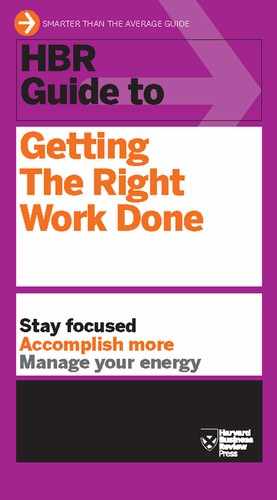Chapter 11
How to Stay Focused on What’s Important
by Gina Trapani
Most of us spend our workdays in one of two ways: reacting to urgent demands, or proactively focusing on what we decided ahead of time are our most critical tasks to accomplish. The best way to be productive is to mitigate the urgent to work on the important.
What’s the difference between urgent and important?
“Urgent” tasks include things like:
- Frantic e-mails that need a response “right now”
- Sudden requests that seem like they’ll take only two minutes but instead take an hour
- Putting out fires—especially others’
- Fixing the day’s crisis rather than stepping back to consider what will solve the chronic problem
- Tasks you’d rather do first because they’re less intimidating than your priorities
We’re drawn to these seemingly “urgent” tasks because they keep us busy and make us feel needed and essential. If we label projects as urgent, it justifies the time and attention we throw at them.
But dealing with a constant stream of “urgent” tasks leaves you wrung out at the end of the day, wondering where all your time went, staring at the important work you’ve yet to start, much less complete.
On the flip side, important work:
- Moves you and your business toward long-term goals
- Can be hard work that feels scary because you’re not confident you can actually do it
- May not give you that same shot of adrenaline that “urgent” requests do
If your workplace encourages constant, frantic headless-chicken running, it can feel impossible to focus on what’s actually important versus what seems urgent. Still, an awareness of the difference and a few simple techniques can help. Here are three.
Choose three important tasks to complete each day
Write them down on a slip of paper and keep it visible on your desk. If, for example, you’re tempted to respond to an e-mail notification, check your list and remember that that “ding” probably has nothing to do with your most critical work. When you have an unexpected hour thanks to a canceled meeting, move forward on those three important tasks.
Turn off your e-mail
Shut down Outlook, turn off e-mail notifications on your mobile, and do whatever else you have to do to muffle e-mail interruptions. When you decide to work on one of your important tasks, give yourself at least an hour of uninterrupted time to complete it. If the Web is too much of a temptation, disconnect your computer from the Internet for that hour.
Set up a weekly 20-minute meeting with yourself
Put it on your calendar, and don’t book over it—treat it with the same respect you’d treat a meeting with your boss. If you don’t have an office door or you work in a busy open area, book a conference room. Go there to be alone. Bring your project list, to-do list, and calendar, and spend the time reviewing what you finished in the past week and what you want to get done next week. This is a great time to choose your daily three important tasks. Productivity author David Allen refers to this as the “weekly review,” and it’s one of the most effective ways to be mindful of how you’re spending your time.
For other ideas on how to tackle your day, see “Power Through Your Day in 90-Minute Cycles” (later in this guide) and “A Practical Plan for When You Feel Overwhelmed” (earlier in this guide).
____________
Gina Trapani is the founding editor of the personal productivity blog Lifehacker.com.
______________
Adapted from content posted on hbr.org on February 18, 2009.
